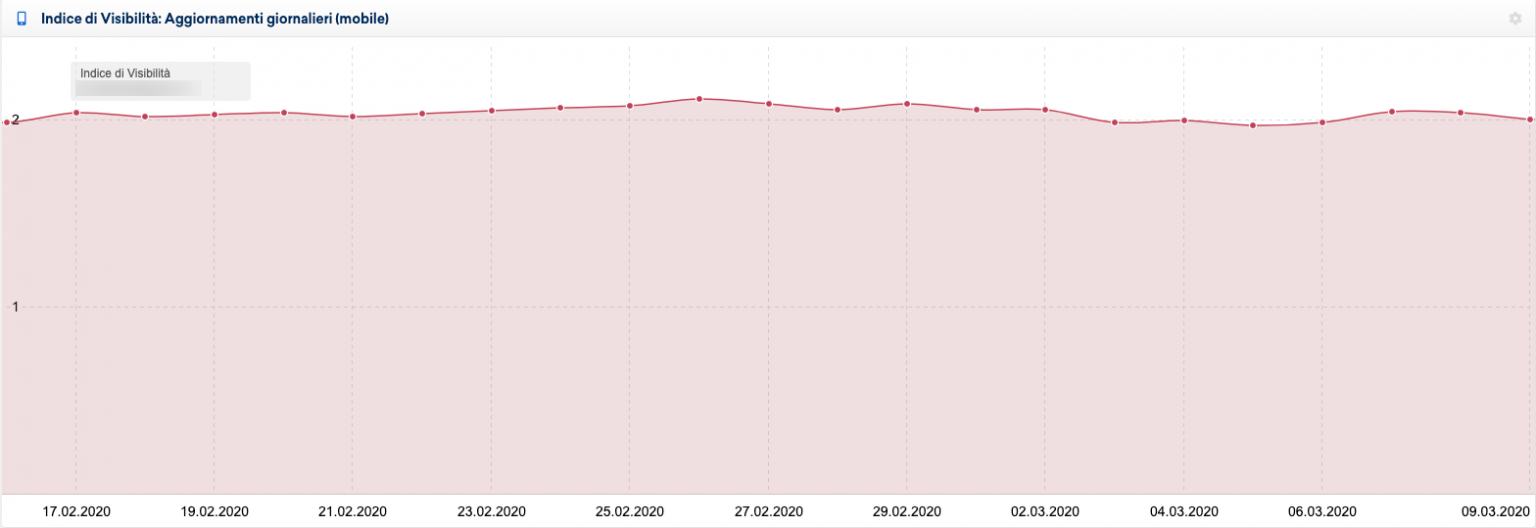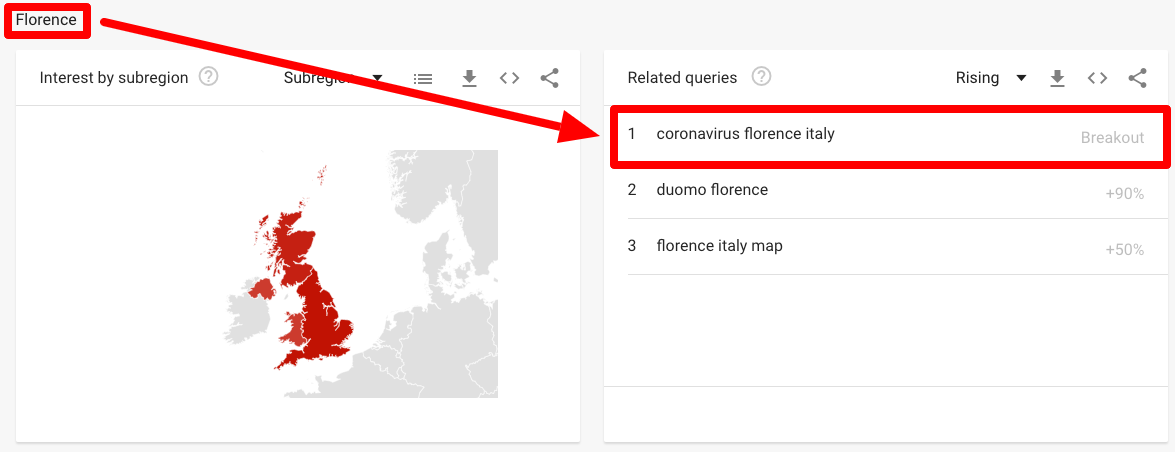NEWS
SEO and the Coronavirus “update”

Sometimes you do not need a Google update for seeing your traffic and revenues tanking.
If you are thinking that a Core Update is the worst you can experience as an SEO, I suggest you change your mind.
Covid-19, better known as coronavirus albeit is just one of the many coronaviruses present, can have a stronger or similar impact than a Core Update with the big difference that it is not something you can try to contrast with “better content”.
Simply, people stop searching for the topics, products, and services you offer or – even if they would love to buy your services – they cannot because they cannot move out of their Red Zone.
In this post I will try to present you how the Covid-19 is affecting the organic traffic of healthy websites and because it is the niche that has been mostly affected by the coronavirus “update”, I will present you only travel sites’ cases (the effects are partly visible also in other kinds of websites, like local businesses and some B2B and B2C eCommerce niches).
Especially, my intention when writing this post is to prevent you from something that now is affecting me and Italian SEOs, but that will probably affect you in the next weeks. We Italians are just a few weeks before you in this of Covid-19.
As “an image is worth 1,000 words”, look at the Google Analytics graph if this Italian website specialized in promoting holidays in the island of Sardinia, and targeting only the Italian market:
Scary, isn’t it?
So, let me give you some context to the GA screenshot:
- On February 20th, the first Italian cases had been declared;
- In just a few days, the Covid-19 confirmed cases went from 3 to 400;
- Around February 27th, the first cases of death due to Coronavirus complications started;
- In those early days, the Italian government began to present a series of very severe acts with the aim of containing the spread of the infection as much as possible (i.e.: the creation of Red Zones limited to a few little towns in Northern Italy)
- Despite the hysteria just after the news and Red Zones declaration, it seemed that people were returning to its pre-coronavirus normality, and returning to think to travel (Sardinia is one the Italian top destinations, especially for people in the North of Italy).
- However, things got worse rapidly asap the number of infected people and deaths started multiplying (note: in Italy the number of tests done had been done more widely than in other European countries or the USA), and even stricter resolutions from the government, a mix of hysteria, depression and also – let me tell you – common sense arose again.
- On March 7th, finally, the Italian government decided to declare “Orange Zones” 16 provinces in Northern Italy (amongst them Milan, Padua, Vicenza, Venice and Rimini and others that represent the core of the economical power of Italy). Orange Zones are zones from special measures that are active such as, for example, the prohibition to travel for reasons that are not really justified for family or work reasons.
In the screenshot above you can easily see what was the effect on a travel site.
Ok… what about the website, you are maybe asking.
Unfortunately, I cannot cite it, so I ask you to trust me.
It is, as I said, it is a travel website specialized in hotel reservation on the island of Sardinia, one of the top holidays’ destinations for Italians, and its main target is the Italian families (family travel niche)
It is not a masterpiece if we talk of SEO, in fact, we are working on improving its quality both technical and content-wise. It had been mildly it by the last January 2020 Core Update, but during the “Coronavirus update” rollout, its SEO Visibility was practically flat (+0.19 as reported by SISTRIX):

When it comes to rankings, and despite having to compete against giants like Booking, Expedia, Tripadvisor, and Trivago or other very fierce specialized travel website (to not talk of Google itself), this client of mine if ranking in the top 3 for very competitive keywords like “Hotel Sardegna”, “Last minute Sardegna”, “Offerte Sardegna” (Sardinia offers), “Villaggi Sardegna” (“Villaggi” are an Italian word that partly corresponds to “Resorts”).
Similar is the case of this website 100% specialized in traveling with kids and targeting the Italian market too:
In this case, the core strategy of this website always has been to produce high-quality content about travel destinations for families with kids, what to do there, the events for families held in Italian and foreign cities et al… but:
- Families with kids between 0 and 12 y/o are the most influenced by the state of panic;
- Even if their sons are not going to school (schools have been closed to contain the Covid-19 spread), they still “go to school”, albeit virtually with online lessons and homework;
- Now, then, the 16 million Italians – many of them with kids – living in the Orange Zones cannot travel or even move out of their province and strongly urged to go out from home if not strictly necessary;
- In the rest of Italy, people can travel with no limitation, albeit the no-travel recommendation is valid also for them. However, considering that public events are now forbidden, museums are close (even churches are closed) and sports events are played with not public, people have no interest in searching for travel to do with their kids or for events to go with them.
Neither this website is a masterpiece of SEO, in fact, I am collaborating with them actively since last summer because it received a quite important hit in coincidence with the June 2019 Core Update.
Nevertheless and despite its defects, it is the most relevant and with the biggest organic visibility in its niche.
Could it be worst?
Yes.
Let say you have a series of websites that promote luxury holidays in some of the best regions of Italy (Sardinia, Puglia, Sicily or Tuscany), and that your main market it’s not the Italian one but the international and all of a sudden a health crisis hits your country: surely it is not the best kind of promotion you can have for selling the beauty of Italy and even if the coronavirus cases are very low in the promoted regions (11, 40, 53 and 166 respectively as for March 8th data vs the 4,189 of Lombardy)
Here below the traffic from Germany to a website marketing Sardinia:
And this below is the organic traffic from UK evolution during these last 3 weeks of a niche travel site specialized in holidays in Sicily:
Considering how much panic and hysteria are all over the western countries (toilet paper now being more searched for than diamonds), this situation was inevitable. Just look at what Google Trends tells us today itself about the interests in the UK related to Florence as a tourist destination:

Moreover, you must consider how much Query Deserves Freshness is totally reshaping the SERPs.
For instance, this is what Google presents when searching for “Travel to Italy“:

As you can see, and if we exclude the Google Flights and Visual Stories features, right now there is only 1 organic search result, which is not about Italy and coronavirus. Even the most prominent People Also Ask question is about how safe is to travel in Italy now!
I could present here more cases of websites I have direct access to, but the story would be the same in every case.
What does all this mean?
Right now for travel and tourism-based business companies in Italy, the situation is quite dramatic. Refunds by itself do not represent the biggest problem (February and March are low seasons) but the stop of reservations yes. Easter season (next April 12) is given for lost and the summer is getting closer, especially if we consider the holiday season of countries like Germany or the USA.
Many of the less robust online travel companies will be economically strongly affected by this situation and, considering that 5,5 of Italy’s GDP is represented by tourism and related jobs’ categories, the entire economy will be affected too.
Just imagine what could be the effect of a similar crisis in countries like Spain, where tourism represents 14.4% of its GDP.
What SEO can do?
SEO alone, obviously, cannot save a website from a situation of almost 0 revenue that is caused by an uncontrollable external reason like Covid-19.
However, as a good Star Wars fan, I believe that “Rebellions are built on hope”, and SEO can contribute to building this hope.
It is common sense that when the Coronavirus crisis will end (because it will end), people will return probably stronger to desire traveling, especially after having been obliged to not leave their towns for a long period.
SEO is all about the long period, so what we can do now is working for that day, improving the overall quality of the website and making it improve in its organic visibility already. Now it won’t probably mean more traffic and more revenues for everything I explained before, but it will mean instant visibility after, especially when the Query Deserves Freshness impact of travel queries will return to normality.
In the short term, then, and in preparation for the return to normality, the most important thing is protecting the brand, in this case, Italy ad travel destinations as brands. Not all the country is an Orange Zone, neither everything will be closed to the public from now on.
It is fundamental, then, to review the editorial planning and strategy for Search:
- Discard everything that cannot be achieved. Don’t write guides about what to visit today in Milan, simply because nobody can go to Milan if not for imperious travel or familiar needs.
- Do not promote short terms offers that maybe cannot be fulfilled.
- On the contrary, create content that assures people about how to safely travel, if they need to travel, with certain contrasted information.
- Create content that makes remember that your destinations will be there when the crisis will end, and promote “book early” campaigns with all the guarantees for cancellations provided clearly.
- Optimize for being in an outstanding position for last minute and last second related queries. ASAP the crisis will end, most probably people will desire to escape from their hometowns, which has been a sort of prison for many weeks.
- Do not create memes and jokes about the virus and how people react to it. Sure, they are funny, but not appropriate for a brand.
- Review your paid campaigns and suspend all those ones that do not have much sense to maintain at this moment. Create your campaigns to promote your destination in the long term and remember that in most of the case the real search session in travel is about 60/90 days long.
- Be proactive with your audience. What can you do to facilitate its life in this crisis? If you’re a travel website, facilitate the refunds or offer the possibility to postpone the travel/hotel reserve to a future time with no added cost, even if the date will be in your high season. If you are an eCommerce, make all your product “Prime” and assume the expedition costs. Acts like these are not easy to assume for a business company that is dealing with the economic impact that a crisis like this one means but are those that people tend to remember and that make a brand a Brand.
And, finally, if you are an SEO and you can afford it, consider the opportunity to support pro-bono the little businesses that are affected by the economic crisis derived by the coronavirus. Helping them passing through this, you will help to the resurge of the economy.
